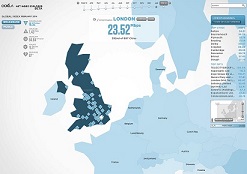Broadband
The Importance of Broadband Internationally
The importance of Broadband Infrastructure is internationally verified by the activation of various advanced countries in the direction of developing the appropriate Broadband infrastructure, adopting it to the standards of economy growth and coping with random “technological blockade” of citizens. The State seems to have the leading role in this evolutionary environment.
The future in the sector of Broadband networks and infrastructure is expected of course, to be internationally determined not only by the telecommunication organizations and the content providers, but by the appeal that new services and applications will have on consumers. The expected evolution is conducted slowly, considering that the technological developments bring radical changes in those involved in the telecommunication market.
The development of Broadband services in the sectors of public administration, education and health could eventually be proven to be of great importance in the expansion of the Broadband because of their following characteristic: a unique sector (the state) could be the main lever of development by promoting the use not only to citizens but to corporations too. The state, playing the role of a very important user of telecommunications services and consequently of a big client, could -in the attempt to cover its needs- be the catalyst in the major changes in the developing telecommunication market.
The important role of Broadband networks in the development of a country could be verified by the intense activation of many states, which are setting out the implementation of such infrastructure, as their basic strategic aim. Furthermore, the development of such networks has been adopted by the common European policy for the implementation of the Information Society as well from big organisations such as OECD (Organisation for Economic Co-operation and Development).
The action plan “eEurope 2005” that has been approved by states’ leaders and governments at the European Council in Seville in June 2002 sets the broadband access as a first priority of the European Union. This plan refers, for the first time, to the meaning of Broadband access while sets the target to develop services, applications and content with parallel speedup of safe broadband access to the Internet, modern network public services, e-government, e-learning, e-health, dynamic environment for e-business, safe data structure, mass internet broadband access in competitive prices and comparative assessment of the progress and distribution of best practices. OECD has produced a number of reports, texts and studies which record the progress of the evolution of broadband infrastructure and services, while at the same time underline the points upon which states should focus their attention when understating initiatives.
Public sectors have been internationally led in developing a proper frame that confronts all parameters (socioeconomic, geographical population allocation, regions’ particularities) and taking under consideration the current technological structures and developments. In the last two years, Broadband Task Forces have been created in various countries (England, Ireland, Italy, Canada, U.S.A. and others).
The role of those "forms" is basically a leading, coordinating and sensitization role. Their recommendations for interventions (motives, financing, and adoption of a prescriptive framework) along with the encouragement of broadband requests by ultimate users, all seek to urge the state and the market to force the development of Broadband infrastructure and services. It is appreciated that these actions will upgrade the market and they will ensure the supply of Broadband Services in far-off or less developed areas.
The above-mentioned advantages are more than obvious in all countries. In order to be much more effective, it is necessary to currently acknowledge all particularities of our country and think how we can take advantage of those so as to achieve the best possible results through coordinated actions.














